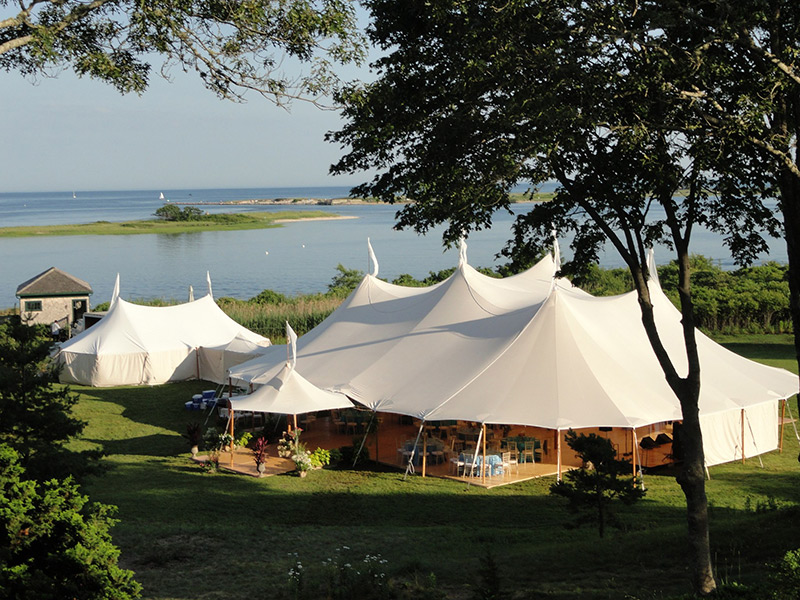However, we’d be liars if we insisted outdoor event planning is easy. But that’s where we come in – our decade-plus experience tenting in a variety of terrain, seasons, and weather means that we can walk you through each vital consideration and answer any question along the way.
Here are some tips to keep in mind when planning an outdoor event:

Guest Count
The first things our event specialists will ask you are: 1) What will the tent be used for, 2) How many guests are expected, 3) Is it sit-down dining or buffet, and 4) Do you need a dance floor or band stage? Once these initial details are ironed out, we can recommend the appropriate tent size(s) for your event. If you plan on a lounge area in the tent, standalone farm tables, or other décor elements that will take up a lot of space, tell us as soon as possible. As planning progresses, use our online-based layout planner [link] to further refine your tent’s layout.
Flooring
We specialize in outdoor flooring, whether it’s fully flooring an entire tent for optimum guest comfort or arranging a dance floor to accommodate your guest count. But that’s not all – we can also create walkways leading to a tent, aisles and platforms for ceremonies (even on the beach) [link], and open-air dance floors surrounded by bistro lights [link]. View all flooring options. [link]
Lighting
Lighting is a key element to the overall design of a tented event. Our lighting choices range from our affordable copper onion lanterns mounted on center poles to the more elaborate placement of chandeliers strung between center poles to the classic choice of bistros or Japanese lanterns strung throughout the tent. For a more refined lighting scheme, we offer pinspots, uplights, and also stage and dance floor lighting. View all lighting options. [link]
Rain
No one wants to think about rain for their event, but it does happen, and oftentimes it adds an unexpectedly pleasant intimacy and peace to the day. Seasoned event pros like planners and caterers know that a Plan B is always a good idea for rain preparedness. Typical rain equipment includes a tent for the ceremony, a tent for cocktails (so guests don’t crowd into the reception tent too early), covered walkways between tents (particularly between the catering and reception tents), and sometimes heaters to combat a chill in the shoulder seasons.
Creative Tent Use
There are so many creative ways to use tents, which is why multi-tent setups are always so much fun. The greatest benefit is that your guests can flow from one destination to another, versus spending an entire afternoon or evening under just one canopy. Inspired tent uses that we’ve seen include a kids’ play/craft tent; cigar-rolling and whiskey-tasting tent; welcome tent with escort card display, water, and signature cocktails; a cocktail tent with funkier décor than the reception; and a photo booth tent with lounge furniture.
Catering
Don’t forget your caterer! If your event is small, it’s possible that the caterer can work out of the house or garage, but if it’s larger or far away from buildings, a catering tent will be required. We typically use solid sides to hide the goings-on inside and place it right beside the main reception tent. Since your caterer is experienced at outdoor events, he or she will know what size tent works best for the prep, cooking, and serving needs.
Power
For a medium to large tented event, running extension cords from a home or building is not going to cut it. The lighting in our tents requires power, as do many event vendors, including the caterer and DJ/band. Familiarize yourself with how many dedicated circuits your vendors need, and then either have an electrician install a special panel for the event date or, if far from a building, rent a generator to ensure uninterrupted power for all.
Setup/Takedown
While it’s possible that your event planner or venue contact will coordinate the setup/takedown, or that your vendors will work together, it’s always a good idea to keep track of when the tent needs to go up and when the other party rentals need to be delivered, and vice versa for takedown. Double check the rules of your venue as well; certain days of the week and times of the year might leave very small setup/takedown windows, and it’s best to know of any severe limitations in advance.